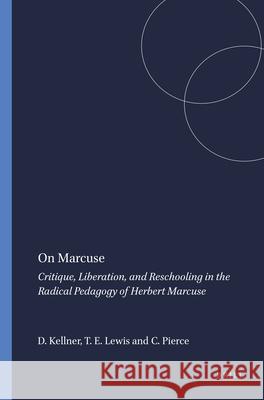On Marcuse : Critique, Liberation, and Reschooling in the Radical Pedagogy of Herbert Marcuse » książka
On Marcuse : Critique, Liberation, and Reschooling in the Radical Pedagogy of Herbert Marcuse
ISBN-13: 9789087905170 / Angielski / Miękka / 2008 / 48 str.
Herbert Marcuse was one of the most important and renowned philosophers of the 20th century. His thought and his involvement in global student movements played a decisive role in transforming the political landscape of the 60s and 70s in the United States. For many he is remembered as the father of the so-called New Left, a figure who represented theoretical clarity through the fog of war, counterrevolution, and the repression of freedom in advanced industrial society. Yet how did such an influential and powerful thinker interpret the role of education during the turbulent period in which he lived? On Marcuse: Critique, Liberation, and Reschooling in the Radical Pedagogy of Herbert Marcuse seeks to offer ground-breaking answers to this question. Despite his well known relationship with radical student activism, very little has been written on Marcuses educational philosophy or its connection with his larger critical theory. Drawing on never-before-published archival materials including lectures dating from 1968-1975, this volume presents a definitive overview of Marcuses educational legacy and its relevance for the contemporary moment. On Marcuse systematically lays out how Marcuse continues to be an important theorist for understanding themes such as educational standardization, critical and dialectical thought, democratic schooling, and the distinction between schooling for social needs and schooling for liberation and health. By situating Marcuses dialectical analysis of the progressive and conservative trends in schooling within an overall critique of one-dimensional society, this volume demonstrates the importance of the theme of education for Marcuses overall critical theory and political project. Critical theorists of education, Marcuse scholars, educators, and students will be struck by the unmistakable accuracy of Marcuses diagnosis of education in one-dimensional society and his challenges for a democratic reconstruction of education. Hence, On Marcuse provides us with not only timely theoretical tools and concrete pedagogical strategies for combating educational sickness caused by one-dimensional society, but also hope in the revolutionary potentials of "reschooling."











